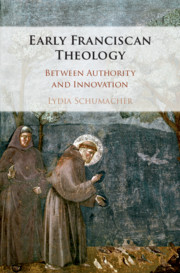Book contents
- Early Franciscan Theology
- Early Franciscan Theology
- Copyright page
- Dedication
- Contents
- Acknowledgements
- Abbreviations
- Chapter 1 Early Franciscan Theology: An Introduction
- Chapter 2 The Franciscan Context
- Chapter 3 The Philosophical Context
- Chapter 4 Theological Vision
- Chapter 5 Theistic Proof
- Chapter 6 The Divine Nature
- Chapter 7 The Trinity: Context
- Chapter 8 The Trinity: Doctrine
- Chapter 9 Christology
- Chapter 10 Incarnation
- Chapter 11 Moral Theology
- Chapter 12 Conclusion: The Promise of Early Franciscan Theology
- Bibliography
- Index
Chapter 2 - The Franciscan Context
Published online by Cambridge University Press: 14 June 2019
- Early Franciscan Theology
- Early Franciscan Theology
- Copyright page
- Dedication
- Contents
- Acknowledgements
- Abbreviations
- Chapter 1 Early Franciscan Theology: An Introduction
- Chapter 2 The Franciscan Context
- Chapter 3 The Philosophical Context
- Chapter 4 Theological Vision
- Chapter 5 Theistic Proof
- Chapter 6 The Divine Nature
- Chapter 7 The Trinity: Context
- Chapter 8 The Trinity: Doctrine
- Chapter 9 Christology
- Chapter 10 Incarnation
- Chapter 11 Moral Theology
- Chapter 12 Conclusion: The Promise of Early Franciscan Theology
- Bibliography
- Index
Summary
Since modern research on the Franciscan school first started to gather momentum in the late nineteenth century, scholars have debated the so-called ‘Franciscan Question’, that is, the question as to which sources provide the most reliable picture of Francis of Assisi and early Franciscan life.1 The answer to this question is decisive for determining whether the early developments in the order that facilitated its institutionalization were ultimately consistent with the original vision of Francis or led to its perversion. One of the most significant of these developments involved the establishment of educational programmes. As we have already seen, the composition of the Summa Halensis was part of a larger effort to get early Franciscan education off the ground and indeed to assert the authority of Franciscan scholars in the university context. Thus, the question arises whether the Summa itself was part of a larger process of departing from Francis’ original vision for his order, or whether it represents an authentic effort to lay down an intellectual tradition, whereby gifted novices and even seasoned scholars might be inducted into the Franciscan, not to mention academic, way of life.
- Type
- Chapter
- Information
- Early Franciscan TheologyBetween Authority and Innovation, pp. 30 - 54Publisher: Cambridge University PressPrint publication year: 2019

